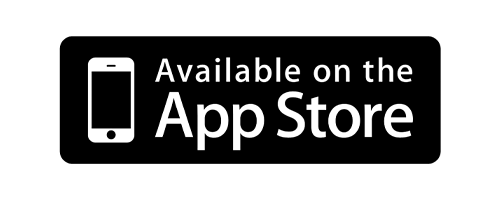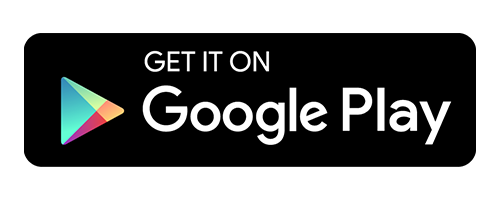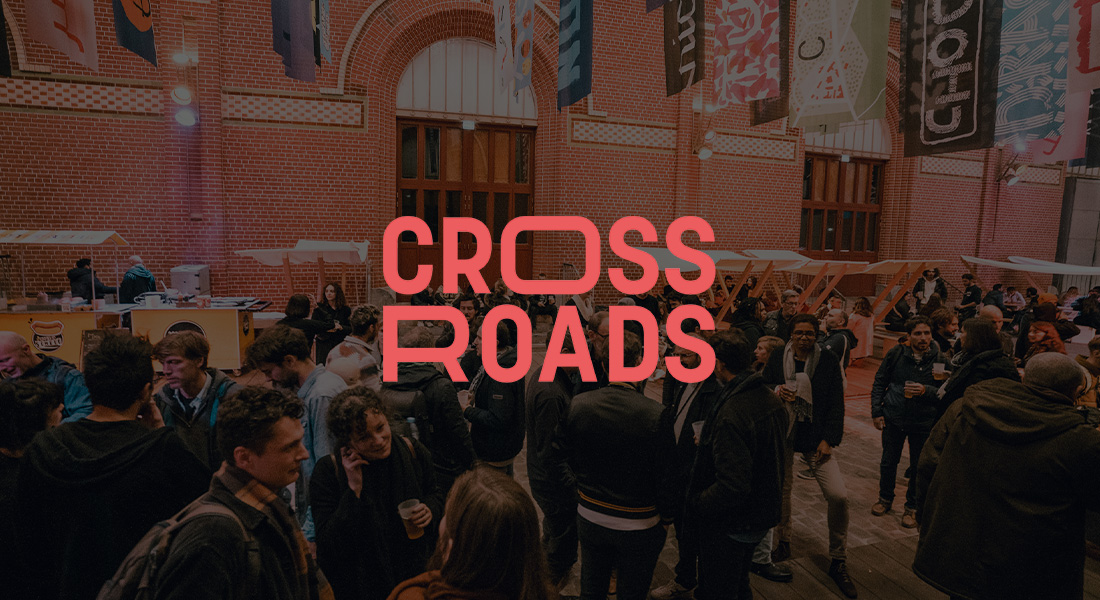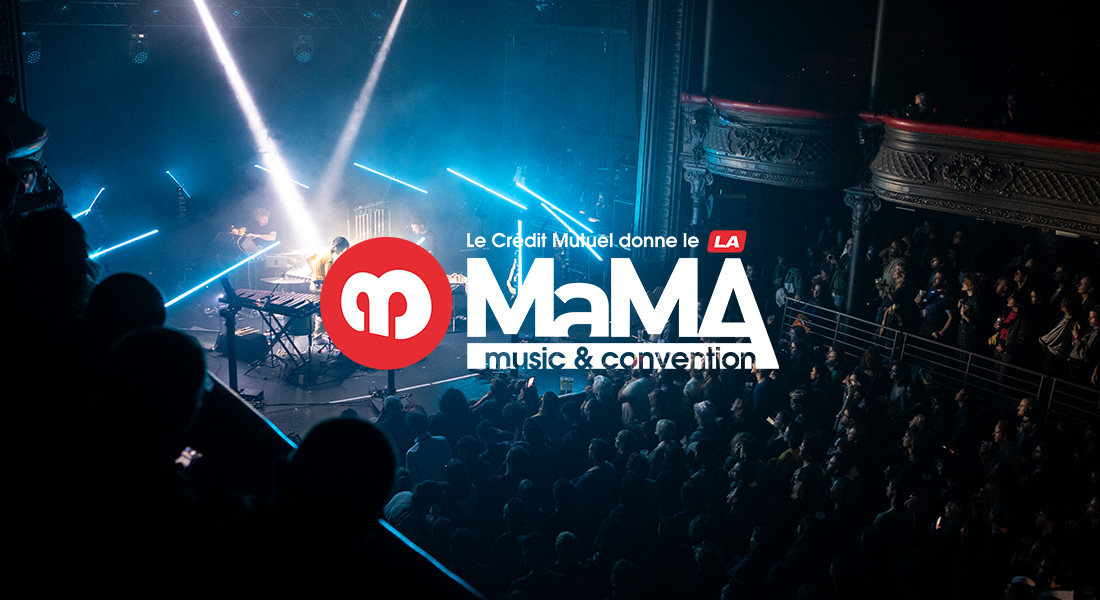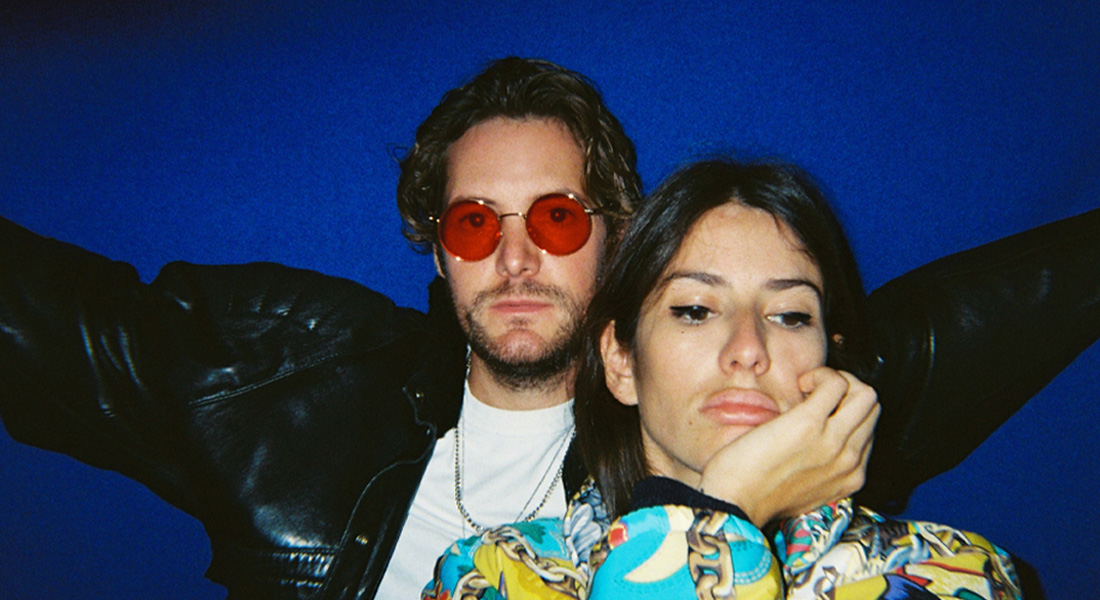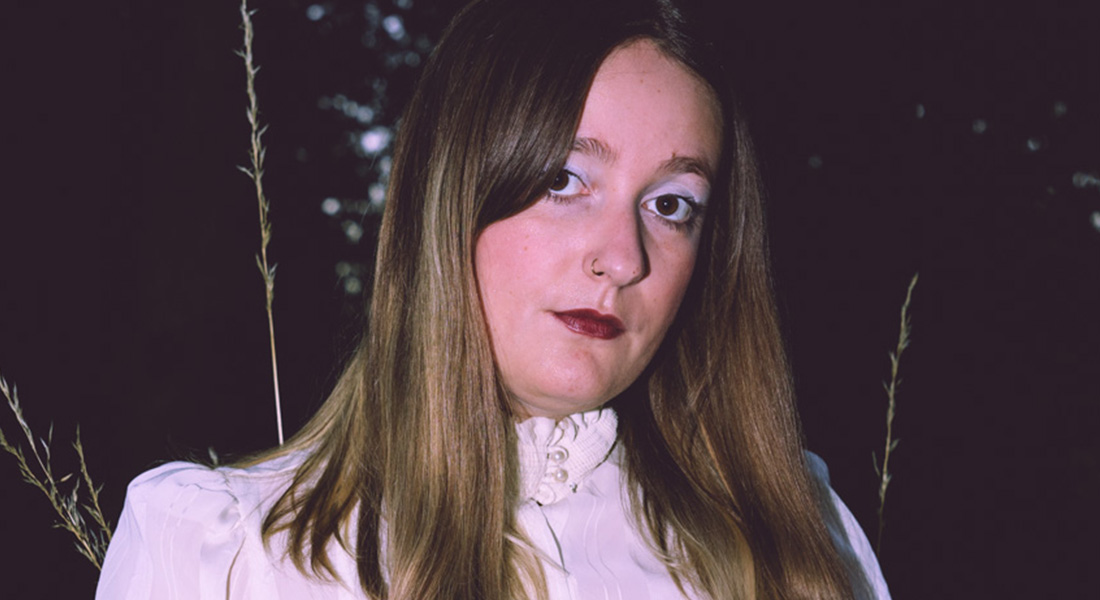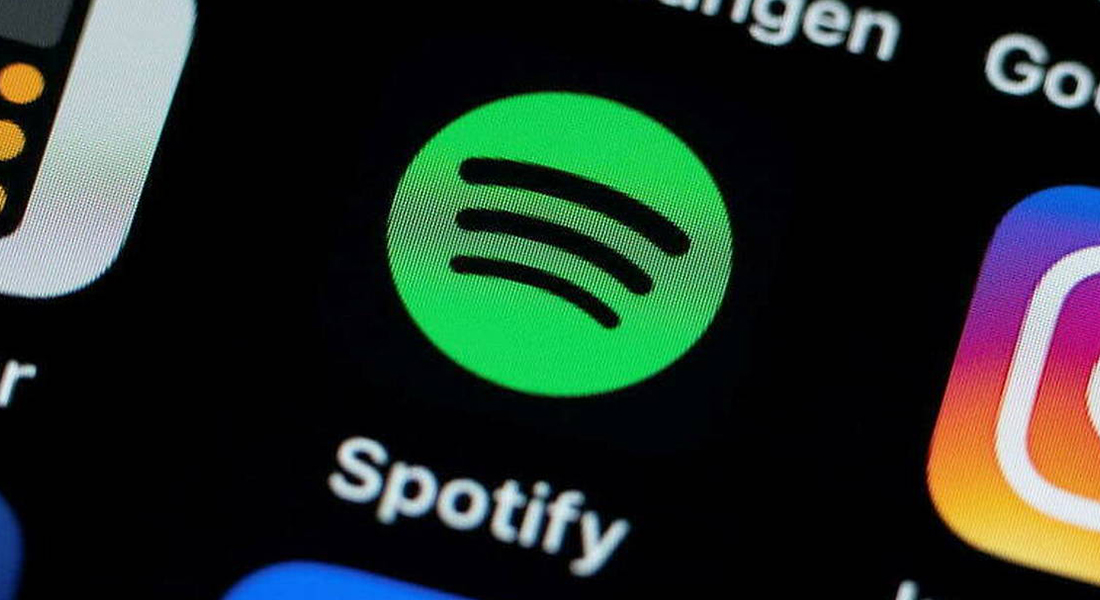You have certainly already heard about this in the past few months : NFTs are blowing up in the music industry. However, when you have seen artists like Grimes or Aphex Twin sell digital products – like songs, art or even videos – as NFTs on various marketplaces, you have probably asked yourself what NFTs are all about and why they have been getting so much attention from the music industry.
NFT stands for “Non Fungible Token”, a complex-looking name that actually are what the blockchain technology identifies as “smart contracts”, aka contracts that prove that you are the sole owner of a digital product you’ve bought with cryptocurrency.
However, a digital product – aka a picture, a video, an mp3 file – can be copied an infinite amount of times. It therefore seems contradictory to be able to “own” a video that is so easily accessible by everyone on the internet… and yet, it is possible. How ? Well, thanks to the blockchain technology, the same technology that cryptocurrencies such as Bitcoin, Ethereum and many others are based on.
So what exactly are NFTs ? How to buy them ? Which marketplaces give access to them ? And above all, how can these “tokens” change the way we listen to & buy music ? A few answers are to be found below.
What this article covers :
Actually, doesn’t feel quite right selling this. Will pass.
— Elon Musk (@elonmusk) March 16, 2021
– Elon Musk auctioned a music video for one of his songs, whose subject is none other than NFTs, before changing his mind a few hours after his announcement, and after an auction valued at several million dollars.
NFTs : what are they and where do they come from ?
NFTs are these digital products that are sold on the blockchain and that may sell for hundreds or even millions of dollars. If the phenomenon has exponentially gained momentum these past few months – the total market value of NFTs amounting to 13 billion in 2021 according to a survey directed by French media Le Figaro, a number to be compared to the 33 million dollars it had gathered in 2020 – all creative industries have hopped on the NFT train, including the music industry.
But what exactly is an NFT ?
An NFT is a contract that proves that you are the owner of a digital file that you have purchased with cryptocurrency. Mainly sold on platforms that use Ethereum (ETH) as an exchange currency, it is necessary to open a cryptocurrency wallet to buy them, which makes these products difficult and not so easy to access for the blockchain newbie.
NFTs come in several packages : audio files, video extracts, pictures or even JPEG files, anything that can is a digital file can be sold as an NFT, for sums ranging from a few dollars to several million. On the music side of it, it is music video bits, live videos, limited editions of songs and even unique artworks that have found their way onto the blockchain technology – and it is the entire music industry that seizes on this phenomenon, from the biggest stars like Grimes or Booba to emerging artists like Jacques or Thérèse.
But why would you want to become the owner of a digital file that can be found anywhere on the web and that can be copied onto any computer in the world ?
Because NFTs are unique. The same way the signed vinyl you have been able to get & that has your name on is unique, the NFT you have just purchased on the blockchain is unique.
So, is this an ephemeral phenomenon or a revolution that is about to profoundly change how we consume music and support artists ?
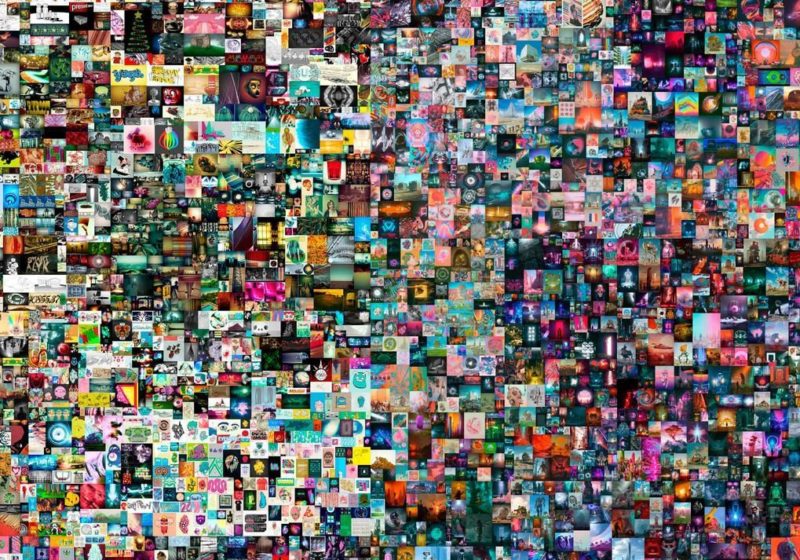
– Beeple’s NFT, sold for close to 70 million dollars in March 2021.
To better understand the NFT phenomenon, let’s go back to when it all started. NFTs have been around for several years now, and they were first known to the early blockchain community – the cryptopunks – as “cryptokitties” ; they have become mainstream as the artistic community (aka modern, contemporary artists like Beeple) took advantage of this new technology and sold their NFTs for such high prices that they made it on to the news. Sometimes sold for several million dollars, buyers, collectors and even crypto traders on the blockchain have been trying to collect as many of them as possible, either for the sole purpose of collecting them or in order to earn even more when selling them again. Some of the most famous ones are from the music band Bored Ape Yacht Club, are essentially artworks that have been bought for several thousand dollars each.
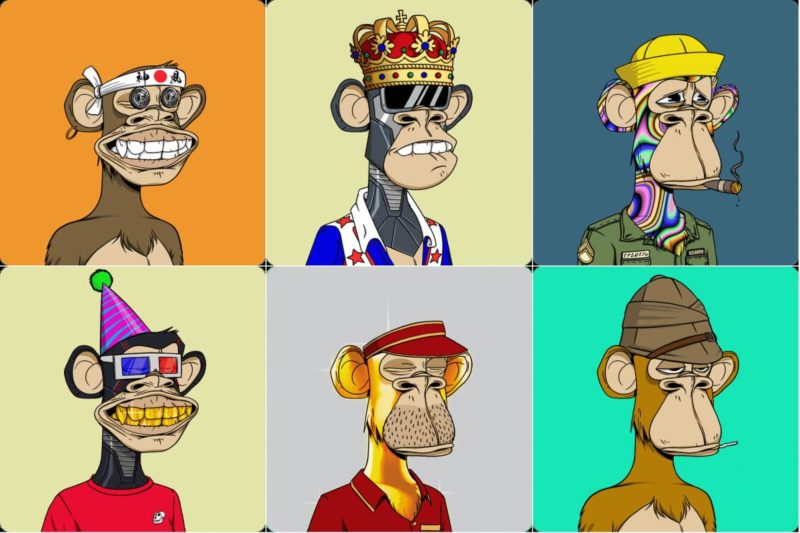
– le Bored Ape Yacht Club, ce groupe de musique dont les NFTs s’arrachent aux quatre coins de la planète
That being said, it’s not just art that sells as NFTs, some infamous videos from the 2010s sell have also been sold this way too : Getter and Nick Colletti have decided to auction off a video that circulated several million times on the web… in 2015. On a more ironic note, Ja Rule decided to sell Trevos DeHaas’ infamous tweet in which he shared the disaster that was Fyre Festival’s food options. Whether these sales are to be seen as jokes or another way to make profit, this is the ultimate proof that anything can sell as an NFT as long as it’s been posted on the internet, that it’s a digital product, and that you’re the original owner of the file.
How can NFTs revolutionize the music industry ?
For some, they are just an ephemeral bubble that will eventually pop, for others, NFTs should be seen as a true revolution for the music industry. Whether it’s one or the other, one thing remains certain : the technological revolution behind blockchain have brought back two key aspects of the music industry : rare & limited edition material, better ways to track royalties and redistribute them to the right people, and above all, a means for independent artists to earn money and live off their art.
NFTs allow music to be collectible again
Although they are highly sought after by lots of music collectors, NFTs are still just finding their place in music listeners’ lives ; even though it is difficult to know what kind of impact NFTs will have on the music industry in the long run, they for sure make it possible to own and collect music again by being sold for a fixed number of copies – just like limited vinyl runs – which is something that had lost its meaning with music streaming, which effectively gave unlimited access to music online to anyone.
Therefore, the same way you collect vinyl or buy your favorite artists’ merchandise, you can collect NFTs in order to recreate your record collection… but digitally, and effectively supporting the artists you listen to in the meantime – something that had also disappeared with the music streaming system, although some changes were seen at Tidal or SoundCloud last year.
Should NFTs then be seen as a step backwards or as a leap forward when talking about the music industry’s business model then ? There seems to be an actual leap forward, and it comes from the revolution that may be brought by the very technology behind blockchain, which could effectively ease royalties distribution, artistic payments but also getting closer with your fanbase as an artist, even allowing for other sources of income on top of the pre-existing ones, such as live gigs and streams.
The blockchain technology : a new way to earn money ?
Among the huge variety of NFTs that can be found on marketplaces, some of them allow artists to give away a fraction of their recording rights – meaning that they are willing to break their royalties share and give it to their fans. If the artist is and will always remain the composer of their work, they can transfer, if they wish, a fraction of their royalties to their fans, by having them buy an NFT and therefore sign a “smart contract” which will make them the rightful owner of this said royalties share.
This is why some people see the blockchain revolution and the non-fungible tokens movement as a neo-PRS or a neo-ASCAP, to quote the words of French economist Nathalie Janson she said in an interview given for Le Figaro. And that’s because the blockchain could indeed, in the long run, ease the way the income that music generates from its sales is redistributed to their rightful owners… but it is not always well-perceived and for good reason, since sharing your rights with your fans is a permanent measure – it is not possible for technical reasons to delete something from the blockchain – and therefore the artists who choose to do so would effectively give away future income and never see the light of it even before their track is officially released.
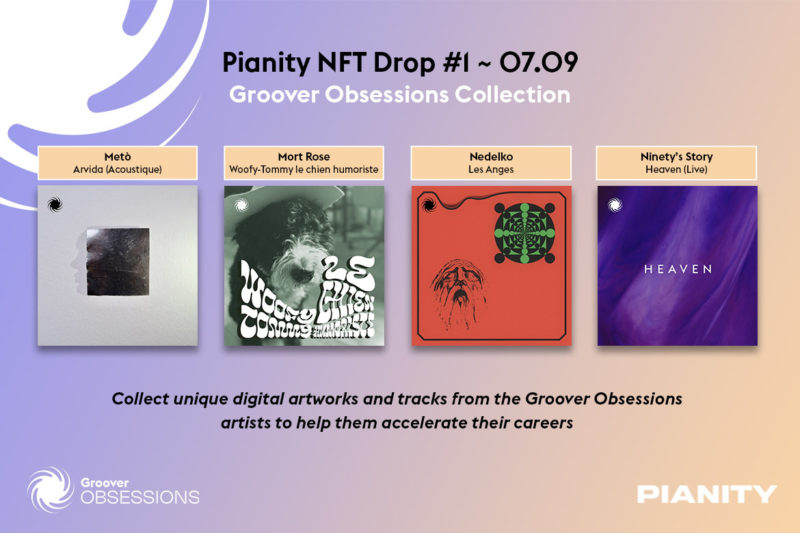
– the French NFT marketplace Pianity has collaborated with Groover Obsessions, Groover’s artist accelerator
How the blockchain can bring artists & their fans closer together.
Opinions on NFTs are, to say the least, extremely divided : some raise awareness about the harmful effects of capitalism which may interfere with artistic creation with such technologies, others see it as a revolution that would allow independent artists to benefit from a new income source and a perhaps more secure one than that of streaming – which, let’s not forget, only pays less than a cent per stream on most streaming platforms, starting with Spotify.
However, despite all the criticism that may rise against NFTs here and there, they give artists the opportunity to express themselves artistically, to monetize their content differently, to offer exclusive content to their fans, and even to get closer to them. This is due to the immense variety of NFTs that can be sold on the blockchain, but also to their adaptability to the musicians’ own artistic vision. And since it is possible to sell, alongside the NFT, real advantages such as access to concerts for a lifetime, or exclusive merchandise, for example, the possibilities of getting closer to your fans thanks to these new technologies are almost endless.
Similar article : Audius : the streaming platform that pays its artists (and listeners) the most ?
And NFTs have gathered the attention of both artists and their fans. At a time when artists look forward to making a living off their music, NFTs seem to offer an alternative to live shows, which have become a lot more uncertain at the time of a global pandemic, and to streaming income, which will very often pay very little, especially when an artist is just at the beginning of their career. A revolution may slowly be rising for emerging artists around the world with these new technologies !
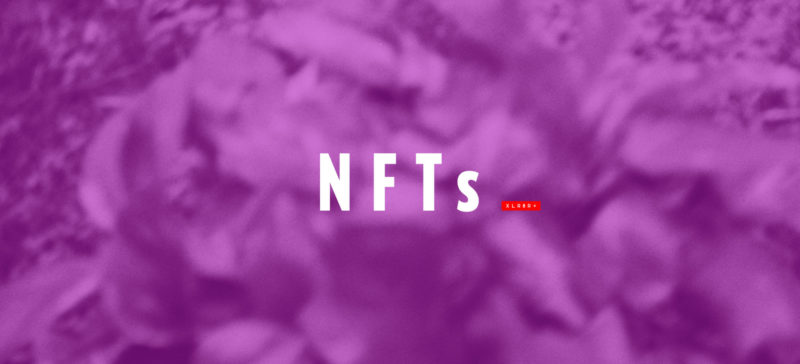
– XLR8R has launched XNFT, their own NFT marketplace entirely dedicated to the electronic music scene
Where can NFTs be bought today ?
Rarible, Opensea, Foundation… the leaders of NFT sales in the artistic & cultural community.
Most of the leaders in the NFT realm are marketplaces that have been used by lots of artists, ranging from musicians to contemporary artists and even movie directors ; Opensea remains one of the undisputed leaders in the world of NFT sales.
The Foundation marketplace was favored by artists like Aphex Twin or Pluko ; in France, Rarible was the one that Jacques’ label team – Research & Development – has chosen in order to sell the rights of… every second of Jacques’ track called “Vous”. This artistic rather than administrative NFT operation allowed Jacques to share his musical work with his fans – and to offer various advantages in addition to these rights – with more than 280 rights holders, including some renowned artists, such as the artist Agoria who has decided to buy Jacques’ NFT.
In other music genres, Etienne de Crécy and Booba have also surfed on the NFT wave, selling on marketplaces excerpts of their music or their music videos ; as the NFTs were bought by their fan communities, the track and the music video were unveiled exclusively to the NFT buyers.
XNFT, Pianity… these marketplaces dedicated to music are slowly rising to the top.
Among the newcomers in the NFT marketplaces, there are some who have decided to specialize in music NFTs. Among them, there is XLR8R platform and media, a tastemaker in the world of electronic music, which launched XNFT, its own platform in April 2021. It is entirely dedicated the sale of NFTs of artists and producers of electronic music, a way for XLR8R to affirm its desire to bring together the electronic music community.
In France, it is Pianity that takes the lead, giving artists the possibility to sell limited editions of their tracks as NFTs. It has been inaugurated in July 2021 with the following motto : giving 80% of each NFT transaction back to the artist, therefore allowing them to make a lot more money than they would with streaming platforms for example.
The world of NFTs is still gaining momentum as these lines are being written. Collectors but also aspiring crypto traders accustomed to cryptocurrency marketplaces are still looking for the next NFT deal, and music institutions are also starting to pay attention to this new music market, with streaming and distribution pure players like IDOL taking a particular interest in it. Sacem – the French equivalent of ASCAP or PRS – is also paying attention to NFT sales, and overall, there might be another revolution coming the music listeners’ way : Kevin Primicerio, co-founder of the Pianity platform, said to Le Figaro that they want to slowly turn their marketplace into an alternate form of streaming platforms. Maybe are we at the dawn of a new profound change in the global music industry !
Here are a few articles for you to dig into if you want to learn more about the NFTs phenomenon :
- Pitchfork : Why do NFTs matter for music.
- Wired : NFTs Boom as Collectors Shell Out to ‘Own’ Digital Art.
- Rolling Stone : A Field Guide to Music’s Potential Crypto Boom.

